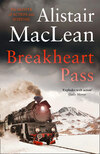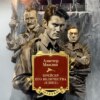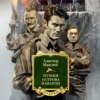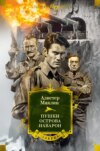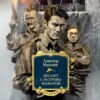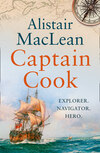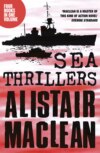Читать книгу: «Breakheart Pass», страница 2
‘An old trick,’ the seated man said. His voice was low but, considering the highly compromising situation in which he found himself, remarkably steady. ‘Somebody put it there. Somebody who knew I had the ace.’
‘What’s your name?’
‘Deakin. John Deakin.’
‘Stand up, Deakin.’ The man did so. Pearce moved leisurely round the table until he was face to face with Deakin. Their eyes were on a level. Pearce said: ‘Gun?’
‘No gun.’
‘You surprise me. I should have thought a gun would have been essential for a man like you -for self-defence, if nothing else.’
‘I’m not a man of violence.’
‘I’ve got the feeling you’re going to experience some whether you like it or not.’ With his right hand Pearce lifted the left-hand side of Deakin’s sheepskin coat while with his free hand he delved into the depth of Deakin’s inside lining pocket. After a few seconds’ preliminary exploration he withdrew his left hand and fanned out an interesting variety of aces and face-cards.
‘My, my,’ O’Brien murmured. ‘What’s known as playing it close to the chest.’
Pearce pushed the money lying in front of Deakin across to Garritty, who made no attempt to pick it up. Garritty said harshly: ‘My money is not enough.’
‘I know it isn’t.’ Pearce was being patient. ‘You should have gathered as much from what I said. You know my position, Garritty. Cheating at cards is hardly a Federal offence, so I can’t interfere. But if I see violence taking place before my eyes - well, as the local peace-keeper, I’m bound to interfere. Give me your gun.’
‘My pleasure.’ The ring of ominous satisfaction in Garritty’s voice was there for all to hear. He handed his mammoth pistol across to Pearce, glared at Deakin and jerked his thumb in the direction of the front door. Deakin remained motionless. Garritty rounded the table and repeated the gesture. Deakin made an almost imperceptible motion of the head, but one unmistakably negative. Garritty struck him, backhanded, across the face. There was no reaction. Garritty said: ‘Outside!’
I told you,’ Deakin said. ‘I’m not a man of violence.’
Garritty swung viciously and without warning at him. Deakin staggered backwards, caught a chair behind his knees and fell heavily to the floor. Hatless now, he remained as he had fallen, quite conscious and propped on one elbow, but making no attempt to move. Blood trickled from a corner of his mouth. In what must have been an unprecedented effort, every single member of the regular clientele had risen to his feet: together, they pressed forward to get a closer view of the proceedings. The expressions on their faces registered a slow disbelief ultimately giving way to something close to utter contempt. The bright red thread of violence was an integral and unquestionable element of the warp and woof of the frontier way of life: unrequited violence, the meek acceptance of insult or injury without any attempt at physical retaliation, was the ultimate degradation, that of manhood destroyed.
Garritty stared down at the unmoving Deakin in frustrated incredulity, in a steadily increasing anger which was rapidly stripping him of the last vestiges of self-control. Pearce, who had moved forward to forestall Garritty’s next expression of a clearly intended mayhem, was looking oddly puzzled: then the puzzlement was replaced by what seemed an instant realization. Mechanically, almost, as Garritty took a step forward and swung back his right foot with a clearly near-homicidal intent, Pearce also took a step forward and buried a none too gentle right elbow in Garritty’s diaphragm. Garritty, almost retching, gasped in pain and doubled over, both hands clutching his midriff: he was having temporary difficulty in breathing.
Pearce said: ‘I warned you, Garritty. No violence in front of a US Marshal. Any more of this and you’ll be my guest for the night. Not that that’s important now. I’m afraid the matter is out of your hands now.’
Garritty tried to straighten himself, an exercise that clearly provided him with no pleasure at all. His voice, when he finally spoke, was like that of a bull-frog with laryngitis.
‘What the hell do you mean - it’s out of my hands?’
‘It’s Federal business now.’
Pearce slipped the ‘Wanted’ notices from their envelope, leafed rapidly through them, selected a certain notice, returned the remainder to the envelope, glanced briefly at the notice in his hand,glanced just as briefly at Deakin, then turned and beckoned to Colonel Claremont who, without so much as a minuscule twitch of the eyebrows, walked forward to join Pearce and O’Brien. Wordlessly, Pearce showed Claremont the paper in his hand. The picture of the wanted man, little better than a daguerreotype print, was a greyish sepia in colour, blurred and cloudy and indistinct in outline: but it was unmistakably a true likeness of the man who called himself John Deakin.
Pearce said: ‘Well, Colonel, I guess this buys me my train ticket after all.’
Claremont looked at him and said nothing. His expression didn’t say very much either, just that of a man politely waiting.
Pearce read from the notice: “Wanted: for gambling debts, theft, arson and murder.”’
‘A nice sense of priorities,’ O’Brien murmured.
“John Houston alias John Murray alias John Deakin alias” - well, never mind, alias a lot of things. “Formerly lecturer in medicine at the University of Nevada.”’
‘University?’ Claremont’s tone reflected the slight astonishment in his face. ‘In those Godforsaken mountains?’
‘Can’t stop progress, Colonel. Opened in Elko. This year.’ He read on: “Dismissed for gambling debts and illegal gambling. Embezzlement of university funds subsequently discovered, attributed to wanted man. Traced to Lake’s Crossing and trapped in hardware store. To cover escape,used kerosene to set fire to store. Ensuing blaze ran out of control and central part of Lake’s Crossing destroyed with the loss of seven lives.”’
Pearce’s statement gave rise to a splendid series of expressions among onlookers and listeners, ranging from incredulity to horror, from anger to revulsion. Only Pearce and O’Brien and, curiously enough, Deakin himself, registered no emotion whatsoever.
Pearce continued: ‘“Traced to railroad repair shops at Sharps. Blew up wagonload of explosives destroying three sheds and all rolling stock. Present whereabouts unknown.”’
Garritty’s voice was still a croak. ‘He - this is the man who burnt down Lake’s Crossing and blew up Sharps?’
‘If we are to believe this notice, and I do believe it, this is indeed the man. We all know about the long arm of coincidence but this would be stretching things a bit too far. Kind of puts your paltry hundred and twenty dollars into its right perspective, doesn’t it, Garritty? By the way, I’d pocket that money right now if I were you - nobody’s going to be seeing Deakin for a long, long time to come.’ He folded the notice and looked at Claremont. ‘Well?’
They won’t need a jury. But it’s still not Army business.’
Pearce unfolded the notice, handed it to Claremont. I didn’t read it all out, the notice was too long.’ He pointed to a paragraph. I missed this bit, for instance.’
Claremont read aloud : “‘The explosives wagon in the Sharps episode was en route to the United States Army Ordnance Depot at Sacramento, California.” He folded the paper, handed it back and nodded. ‘This makes it Army business.’
TWO
Colonel Claremont, whose explosive temper normally lay very close to the surface indeed, was clearly making a Herculean effort to keep it under control. It was just as clearly a losing battle. A meticulous and exceptionally thorough individual, one who cleaved to prescribed detail and routine, one who had a powerful aversion to the even tenor of his ways being interrupted, far less disrupted, and one who was totally incapable of suffering either fools or incompetence gladly, Claremont had not yet devised, and probably never would devise, a safety-valve for his only failing as an officer and a man. Not for him the gradual release of or sublimation for the rapid and rapidly increasing frustration-based anger that simmered just below boiling point and did all sorts of bad things to his blood pressure. In geological terms, he neither vented volcanic gases nor released surplus superheated energy in the form of spouts and geysers: like Krakatoa, he just blew his top, and the results, at least for those in his immediate vicinity, were, more often than not, only a slight degree less devastating.
The Colonel had an audience of eight. A rather apprehensive Governor, Marica, chaplain and doctor stood just outside the main entrance to the Imperial: some little way along the boardwalk O’Brien, Pearce and Deakin were also watching the Colonel in full cry, although it was noticeable that Pearce had an even closer eye for Deakin than he did for the Colonel. The eighth member was the unfortunate Sergeant Bellew. He was rigidly at attention, or as rigid as one can be when seated on a highly restive horse, with his gaze studiously fixed on a point about a couple of light years beyond the Colonel’s left shoulder. The afternoon had turned cold but Bellew was sweating profusely.
‘Everywhere?’ Claremont’s disbelief was total and he made no attempt to hide it. ‘You’ve searched everywhere?’
‘Yes, sir.’
‘Officers of the United States Cavalry can hardly be a common sight hereabouts. Someone’s bound to have seen them.’
‘No one we talked to, sir. And we talked to everyone we saw.’
‘Impossible, man, impossible!’
‘Yes, sir. I mean, no, sir.’ Bellew abandoned his rapt contemplation of infinity, focused his eyes on the Colonel’s face and said, almost in quiet desperation: ‘We can’t find them, sir.’
The colour of the Colonel’s complexion deepened to a dangerous hue. It required no great feat of the imagination to see that the lava of his fury was about to erupt. Pearce took a couple of hasty steps forward and said: ‘Maybe I can. Colonel. I can pick twenty, thirty men who know every hole and corner in this town - and heaven knows there are not a great number of those. Twenty minutes and we’ll find them, if they’re here to be found.’
‘What the devil do you mean - if?’
‘What I say.’ It was obvious that Pearce was in no placatory mood. ‘I’m offering to be of assistance - and I don’t have to offer. I don’t expect a “thank you”, I don’t even expect an acceptance. A little courtesy would help, though. Yes or no.’
Claremont hesitated, his blood pressure fractionally easing. He’d been brought up short by Pearce’s curt tone and had to remind himself, painfully and almost forcibly, that he was dealing with a civilian, one of that unfortunate majority over whom he had neither control nor authority. Claremont kept his contact with civilians to a basic minimum, with the result that he had almost forgotten how to talk to them. But the root cause of his temporary indecision was the galling and humiliating prospect that those unwashed and undisciplined derelicts of Reese City might succeed where his own beloved troops had failed. When he did reply it cost him a very considerable effort to speak as he did.
‘Very well. Marshal. Please do that. And thank you. Departure time, then, twenty minutes. We’ll wait down at the depot.’
‘I’ll be there. A favour in return. Colonel. Could you detail two or three of your men to escort the prisoner to the train?’
‘An escort?’ Claremont was openly contemptuous. ‘Hardly, I would have thought, a man of violence, Marshal.’
Pearce said mildly: ‘It depends upon what you mean by violence, Colonel. Where the violence involves himself - well, we’ve seen he’s no lover of bar-room brawls. But on his past record he’s quite capable of burning down the Imperial or blowing up your precious troop train the moment my back is turned.’
Leaving Claremont with this cheerful thought, Pearce hurried into the Imperial. Claremont said to Bellew: ‘Call off your men. Take the prisoner down to the train. Have his hands tied behind his back and put him on an eighteen-inch hobble. Our friend here seems to have the habit of disappearing into thin air.’
‘Who do you think you are? God almighty?’ There was a trace, slight though the combination was, of self-righteous anger and quavering defiance in Deakin’s voice. ‘You can’t do this to me. You’re not a lawman. You’re only a soldier.’
‘Only a soldier. Why, you -’ Claremont held himself in check then said with some satisfaction: ‘A twelve-inch hobble. Sergeant Bellew.’
‘That will be a pleasure, sir.’ It was obviously an even greater pleasure for Sergeant Bellew to have his and his Colonel’s displeasure directed against a common antagonist, however innocuous that antagonist might seem, rather than have the Colonel’s wrath directed against him personally. Bellew withdrew a whistle from his tunic, took a deep breath and blew three ear-piercing blasts in rapid succession. Claremont winced, made a gesture that the others should follow him and led the way down towards the depot. After about a hundred yards, Claremont, O’Brien by his side, stopped and looked back. There was issuing forth from the doors of the Imperial what must have been an unprecedented exodus in the annals of Reese City. The motley crew could hardly have been classified under the heading of the halt and the lame and the blind, but they came pretty close to qualifying for it.
Due to the fact that the dilution of their whisky with water would have brought immediate and permanent ostracism to any of the Imperial’s devoted clientele, at least half of those who emerged had the rolling, weaving gait of a windjammer sailor who had spent too long at sea. Two of them limped badly and one, no soberer than the rest, was making remarkably good time on a pair of crutches; he at least had the support that the others lacked. Pearce joined them and issued what appeared to be a series of rapid instructions. O’Brien watched the grey-bearded band disperse in a variety of directions and slowly shook his head from side to side.
He said: ‘If they were on a treasure hunt for a buried bottle of bourbon, I’d have my money on them any day. As it is -’
‘I know, I know,’ Claremont turned dispiritedly and resumed the trek to the depot. Smoke and steam were issuing profusely and Banlon, clearly, had a full head of steam up. The engineer looked out.
‘Any signs, sir?’
‘I’m afraid not, Banlon.’
Banlon hesitated. ‘Still want me to keep a full head of steam up, Colonel?’
‘And why not?’
‘You mean - we’re going to pull out with or without the Captain and the Lieutenant?’
‘That’s precisely what I mean. Fifteen minutes, Banlon. Just fifteen minutes.’
‘But Captain Oakland and Lieutenant Newell -’
‘They’ll just have to catch the next train, won’t they?’
‘But, sir, that might be days -’
‘At the moment, I’m hardly in the mood to worry over the welfare of the Captain and the Lieutenant.’ He turned to the others and gestured towards the steps leading up to the front of the first coach. ‘It’s cold and it’s going to be a damned sight colder. Governor, with your permission, I’d like Major O’Brien stay with me a little. Just until this fellow Deakin is brought along. Nothing against my own men, mind you, none better, but I don’t trust them to cope with a slippery customer like Deakin. But I think the Major can cope admirably - and without exerting himself unduly. Just till Pearce gets back.’
O’Brien smiled and said nothing. Governor Fairchild nodded his agreement, then hastily mounted the steps. Even in the past fifteen minutes the late afternoon had become noticeably colder.
Claremont nodded briefly to O’Brien, then slowly began to walk the length of the train, from time to time slapping his very English swagger-stick - his sole concession to individuality or eccentricity, it all depended upon how one viewed it - against his leather riding boots. Colonel Claremont knew next to nothing about trains but he had been born with an inspectorial eye and rarely passed up the opportunity of exercising it. Further, he was the commandant of the train and Claremont believed in keeping a close and jealous eye upon his own, however temporarily that property might remain in his keeping.
The first coach consisted of the officers’ day compartment - that into which the Governor had so recently and thankfully disappeared - the night compartments for the Governor and his niece and, at the rear, the officers’ dining saloon. The second coach consisted of the galley, sleeping quarters for Henry and Carlos who were steward and cook respectively, and the officers’ night compartment. The third coach was the supply wagon, the fourth and fifth the horse wagons. The first quarter of the sixth wagon was given over to the troops’ galley, while the remainder of it and all of the seventh coach was given over to the troops’ accommodation. None the wiser for his tour of inspection, Claremont reached the brake van, then, hearing the sound of hooves, looked towards the front of the train. Bellew had rounded up his lost sheep: as far as Claremont could ascertain he had the entire cavalry detachment with him.
Sergeant Bellew himself was in the lead. He held loosely in his left hand a rope, the other end of which was looped round Deakin’s neck. Deakin himself, because of the twelve-inch hobble, was forced to walk in a ludicrously fast, stiff-legged gait, more like a marionette than a human being. It was a shameful and humiliating position for any grown man to find himself in but it left Claremont totally unmoved. He paused just long enough to see O’Brien move out to intercept Bellew, then swung himself up the brake van’s steps, pushed open the door and passed inside.
Compared to the chill outside, the atmosphere inside the brake van was close on stifling, almost oppressively hot. The reason for this was not far to seek: the cordwood-burning stove in one corner of the van had been stoked with such skill and devotion that its circular, removable cast-iron top glowed a far from dull red. To one side of the stove was a bin well stacked with cordwood: beyond that again was a food cupboard - if the cordwood bin was anything to go by, Claremont thought, the cupboard would be far from empty - and beyond that again was the massive brake wheel. To the other side of the stove was a massive and massively over-stuffed armchair then, finally, a mattress piled high with faded army issue blankets and what looked like a couple of bearskins.
Almost buried in the depths of the armchair and reading a book through a pair of steel-rimmed and steel-legged glasses was a man who could only, in all fairness to the ancient cliche, be described as a grizzled veteran. He had a four-day growth of white beard on his face; his hair, if hair he had, was invisible beneath what looked like a Dutch bargee’s peaked hat, pulled low over the ears, no doubt to keep out the cold. He was cocooned in considerable but indeterminate layers of clothing, the whole topped off with an Eskimo-type anorak made from equally indeterminate furs. To defeat the ill intent of even the most cunning of draughts, a heavy Navajo blanket stretched from his waist to his ankles.
As Claremont entered, the brakeman stirred, courteously removed his glasses and peered at Claremont with pale blue watery eyes. He blinked in surprise, then said: ‘This is indeed an honour, Colonel Claremont.’ Although over sixty years had passed since the brakeman had made his one and only crossing of the Atlantic, his Irish brogue was still so pronounced that he could have left his native Connemara only the previous day. He struggled to rise - no easy task from the position into which he had wedged himself - but Claremont waved him to sit down. The brake-man complied willingly and cast a meaningful glance towards the opened door.
Claremont made haste to close it and said: ‘Devlin, isn’t it?’
‘Seamus Devlin at your service, sir.’ ‘Bit of a lonely life you lead here, isn’t it?’ ‘It all depends upon what you mean by lonely, sir. Sure, I’m alone but I’m never lonely.’ He closed the book he had been reading and clasped it tight in both hands. ‘If you want a lonely job, Colonel, it’s up there in the driver’s cab. Sure, you’ve got your fireman, but you can’t talk to him, not with all that racket up front there. And when it’s raining or snowing or sleeting you’ve got to keep looking out to see where you’re going, so that you’re either frying or freezing. I should know, I spent forty-five years on the footplate but I got a bit past it a few years ago.’ He looked around him with some pride. ‘Reckon I’ve got the best job in the Union Pacific here. My own stove, my own food, my own bed, my own armchair -’
‘I was going to ask you about that,’ Claremont said curiously. ‘Hardly Union Pacific standard issue, I should have thought.’
‘I must have picked it up somewhere,’ Devlin said vaguely.
‘Many more years to retirement?’
Devlin smiled, almost conspiratorially. ‘The Colonel is very - what do you say? - diplomatic. Yes, that’s right, diplomatic. Well, sir, you’re right, I’m afraid I’m a mite old for the job but I kind of lost my birth certificate years ago and that made things a bit difficult for the Union Pacific. This is my last trip, Colonel. When I get back east, it’s my grand-daughter’s home and the old fireside for me.’
‘May heaven rain cordwood upon you,’ Claremont murmured.
‘Eh? I mean, I beg the Colonel’s pardon.’
‘Nothing. Tell me, Devlin, how do you pass the time here?’
‘Well, I cook and eat and sleep and -’
‘Yes, now. How about sleep? If you’re asleep and a bad corner or a steep descent comes up what -’
‘No trouble, sir. Chris - that’s Banlon the engineer - and I have what they call these days communication. Just a wire inside a tube, but it works. Chris gives half a dozen pulls, the bell rings in here and I give one pull back to show that I’m in the land of the living, like. Then he gives one, two, three or four pulls, all depends how much pressure he wants me to put on the wheel. Never failed yet, sir.’
‘But you can’t spend all your time just eating and sleeping?’
‘I read, sir. I read a lot. Hours every day.’
Claremont looked around. ‘You’ve got your library pretty well hidden.’
‘I haven’t got a library. Colonel. Just this one book. It’s all I ever read.’ He turned the book he held in his hand and showed it to Claremont: it was an ancient and sadly battered family Bible.
‘I see.’ Colonel Claremont, a strictly non-churchgoer whose closest brushes with religion came in his not infrequent conducting of burial services, felt and looked slightly uncomfortable. ‘Well, Devlin, let’s hope for a safe trip to Fort Humboldt and a safe last passage back east for you.’
‘Thank you, sir. Much obliged, I’m sure.’ Devlin had resumed his steel spectacles and had the Bible opened even before the Colonel had the brake van door closed behind him.
Claremont walked briskly towards the front of the train. Bellew and half a dozen of his men were busy dismantling the horse wagon ramps. Claremont said: ‘Livestock and men. All accounted for?’
‘Indeed, sir.’
‘Five minutes?’
‘Easily, Colonel.’
Claremont nodded and continued on his way. Pearce appeared round the corner of the depot building and hurried towards him. Pearce said: ‘I know you’ll never do it. Colonel, but you really do owe Bellew and his men an apology.’
‘No signs of them? None at all?’
‘Wherever they are, they’re not in Reese City. My life on it.’
Claremont’s first reaction, oddly enough, had been one almost of relief - relief that Pearce and his derelict posse had not succeeded where his own men had failed. But now the full implication of their apparent desertion or unforgivably delayed absence returned with renewed force and he said without unclenching his teeth: ‘I’ll have them court-martialled and dismissed the service for this.’
Pearce looked at him speculatively and said: ‘I never met them, of course. Like that, were they?’
‘No, dammit, they weren’t.’ Claremont slashed viciously at the side of his riding boot and barely repressed his wince of pain. ‘Oakland and Newell were two of the finest officers I’ve ever had serve under me. But no exceptions, no exceptions. Fine officers, all the same, fine officers - Come on, Marshal. Time we were gone.’
Pearce boarded the train. Claremont looked back to check that the horse wagon doors were closed, then turned and raised his hand. Banlon gave an acknowledging wave from his cab, moved inside and opened the steam regulator. The driving wheels slipped once, twice, three times; then they began to bite.
Бесплатный фрагмент закончился.
Начислим
+19
Покупайте книги и получайте бонусы в Литрес, Читай-городе и Буквоеде.
Участвовать в бонусной программе
